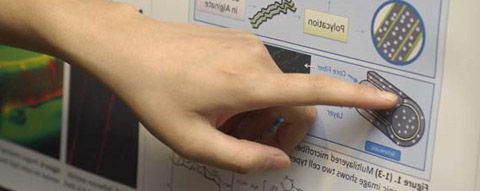Home > Press > Johns Hopkins "Nanoscience for Neuroscience and Neurosurgery" May 18
 |
| Presentation at the poster session of the 2008 NanoBio Symposium. Credit: Will Kirk/JHU |
Abstract:
Students and faculty are encouraged to submit posters for the Johns Hopkins Institute for NanoBioTechnology third annual symposium Monday, May 18, 2009 at the School of Medicine.
Johns Hopkins "Nanoscience for Neuroscience and Neurosurgery" May 18
Baltimore, MD | Posted on April 11th, 2009"Nanoscience for Neuroscience and Neurosurgery" features Johns Hopkins faculty experts in nanobiotechnology, engineering, neuroscience, medicine, imaging, and public health. The poster submission deadline is May 4, 2009. Registration and poster title submissions may be made online at inbt.jhu.edu/symposium/registration/ Prizes will be awarded for the best poster presentations.
"Nanoscience for Neuroscience and Neurosurgery" begins with talks from 9 a.m. until noon in Mountcastle Auditorium of the PreClinical Teaching Building, 725 N. Wolfe St., Baltimore, Md. An afternoon poster session will be held from 1:30 to 3:30 p.m. in Turner Concourse of the Turner Building, 720 Rutland Ave., Baltimore, Md. Nanobiotechnology related research from across every division of the university and medical campus will be on display and presenters will be available to discuss their results.
More information about the symposium, including poster submission guidelines, directions to the medical campus, and further information about the speakers is available at the Johns Hopkins Institute for NanoBioTechnology symposium website. Go to inbt.jhu.edu/symposium/ General registration without a poster is due by May 15, 2009. Corporate sponsorship opportunities are available. Please visit INBT's website for more information.
Speakers from the Johns Hopkins School of Medicine include Ted Dawson, Abramson Professor of Neurodegenerative Diseases; John W. Griffin, Johns Hopkins University Distinguished Service Professor of Neurology, Neuroscience and Pathology and director of the Brain Science Institute; Michael T. McMahon, assistant professor of Radiology, MR Division; Alessandro Olivi, professor of Neurosurgery and Oncology and chair of Neurosurgery at Johns Hopkins Bayview Medical Center; and Jeffrey Rothstein, professor of Neurology and director of the Robert Packard Center for ALS Research.
From the Johns Hopkins Whiting School of Engineering, featured speakers will be Sharon Gerecht, assistant professor of Chemical and Biomolecular Engineering and Hai-Quan Mao, assistant professor of Materials Science and Engineering. Tomas Guilarte, Professor of Environmental Health Sciences, will be the featured speaker from the Bloomberg School of Public Health.
####
About Johns Hopkins Institute for NanoBioTechnology
Our Interdisciplinary Graduate Training Program in Nanotechnology for Biology and Medicine (NBMed) trains engineers and scientists to become adept at the manipulation of the cell/nanotech interface from the physical, materials, and biological perspectives.
For more information, please click here
Contacts:
Institute for NanoBioTechnology
214 Maryland Hall
3400 North Charles Street
Baltimore, MD 21218
Phone: (410) 516-3423
Fax: (410) 516-2355
Copyright © Johns Hopkins Institute for NanoBioTechnology
If you have a comment, please Contact us.Issuers of news releases, not 7th Wave, Inc. or Nanotechnology Now, are solely responsible for the accuracy of the content.
| Related News Press |
News and information
![]() Researchers develop molecular qubits that communicate at telecom frequencies October 3rd, 2025
Researchers develop molecular qubits that communicate at telecom frequencies October 3rd, 2025
![]() Next-generation quantum communication October 3rd, 2025
Next-generation quantum communication October 3rd, 2025
![]() "Nanoreactor" cage uses visible light for catalytic and ultra-selective cross-cycloadditions October 3rd, 2025
"Nanoreactor" cage uses visible light for catalytic and ultra-selective cross-cycloadditions October 3rd, 2025
Nanomedicine
![]() New molecular technology targets tumors and simultaneously silences two ‘undruggable’ cancer genes August 8th, 2025
New molecular technology targets tumors and simultaneously silences two ‘undruggable’ cancer genes August 8th, 2025
![]() New imaging approach transforms study of bacterial biofilms August 8th, 2025
New imaging approach transforms study of bacterial biofilms August 8th, 2025
![]() Cambridge chemists discover simple way to build bigger molecules – one carbon at a time June 6th, 2025
Cambridge chemists discover simple way to build bigger molecules – one carbon at a time June 6th, 2025
![]() Electrifying results shed light on graphene foam as a potential material for lab grown cartilage June 6th, 2025
Electrifying results shed light on graphene foam as a potential material for lab grown cartilage June 6th, 2025
Announcements
![]() Rice membrane extracts lithium from brines with greater speed, less waste October 3rd, 2025
Rice membrane extracts lithium from brines with greater speed, less waste October 3rd, 2025
![]() Researchers develop molecular qubits that communicate at telecom frequencies October 3rd, 2025
Researchers develop molecular qubits that communicate at telecom frequencies October 3rd, 2025
![]() Next-generation quantum communication October 3rd, 2025
Next-generation quantum communication October 3rd, 2025
![]() "Nanoreactor" cage uses visible light for catalytic and ultra-selective cross-cycloadditions October 3rd, 2025
"Nanoreactor" cage uses visible light for catalytic and ultra-selective cross-cycloadditions October 3rd, 2025
Nanobiotechnology
![]() New molecular technology targets tumors and simultaneously silences two ‘undruggable’ cancer genes August 8th, 2025
New molecular technology targets tumors and simultaneously silences two ‘undruggable’ cancer genes August 8th, 2025
![]() New imaging approach transforms study of bacterial biofilms August 8th, 2025
New imaging approach transforms study of bacterial biofilms August 8th, 2025
![]() Ben-Gurion University of the Negev researchers several steps closer to harnessing patient's own T-cells to fight off cancer June 6th, 2025
Ben-Gurion University of the Negev researchers several steps closer to harnessing patient's own T-cells to fight off cancer June 6th, 2025
![]() Electrifying results shed light on graphene foam as a potential material for lab grown cartilage June 6th, 2025
Electrifying results shed light on graphene foam as a potential material for lab grown cartilage June 6th, 2025
|
|
||
|
|
||
| The latest news from around the world, FREE | ||
|
|
||
|
|
||
| Premium Products | ||
|
|
||
|
Only the news you want to read!
Learn More |
||
|
|
||
|
Full-service, expert consulting
Learn More |
||
|
|
||








